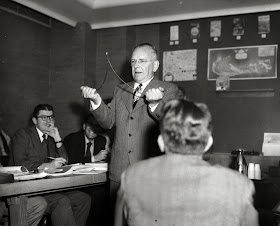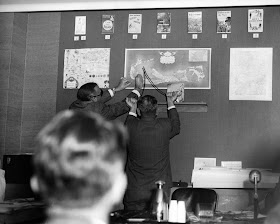 In the late 1930s, author Kenneth Roberts, who had made a name for himself with historical novels including Northwest Passage, Lydia Bailey and Oliver Wiswell, had an experience that would put him at the forefront of the controversial practice of water dowsing. While building his house in Kennebunkport, Roberts solicited the help of former game warden Henry Gross, an expert dowser, to find water on his estate. Using his divining rod, a forked twig, Gross found several "veins" of water as well as a new devotee to the cause. Absolutely convinced about Gross's abilities, Roberts became his agent, establishing an organization called "Water Unlimited" to promote his friend and further the cause. He also published three books on the subject Henry Gross and His Dowsing Rod (1951), The Seventh Sense (1953) and Water Unlimited (1957) which was published posthumously.
In the late 1930s, author Kenneth Roberts, who had made a name for himself with historical novels including Northwest Passage, Lydia Bailey and Oliver Wiswell, had an experience that would put him at the forefront of the controversial practice of water dowsing. While building his house in Kennebunkport, Roberts solicited the help of former game warden Henry Gross, an expert dowser, to find water on his estate. Using his divining rod, a forked twig, Gross found several "veins" of water as well as a new devotee to the cause. Absolutely convinced about Gross's abilities, Roberts became his agent, establishing an organization called "Water Unlimited" to promote his friend and further the cause. He also published three books on the subject Henry Gross and His Dowsing Rod (1951), The Seventh Sense (1953) and Water Unlimited (1957) which was published posthumously. Business was good with requests for Gross's services coming in by the dozens. However, ridicule followed as well. In particular Gross's claims that he was able to dowse long distance by using a map, or that he could locate lost objects by the same method, met with great skepticism. Roberts belief in Henry's ability never wavered though it appears that he was well aware of the limitations of dowsing for anything but water.
Yet, he did try to prove that dowsing could be useful in finding oil as well. In 1954, Roberts sent Gross to the California and Texas oil fields. In a memo to Gross, Roberts acknowledges that this trip was a "great opportunity for you to prove something about which we so far know nothing." He also chastises Gross about his loose tongue and for making claims "that haven't been proved," something Roberts attributed to Gross "using whiskey, especially early in the day." "This is serious business for all of us," he proclaims, "you have no way of knowing how much your abilities are impaired by daytime drinking."
To find out more about the "business" of dowsing take a look at ML-25, the Papers of Kenneth Roberts.



No comments:
Post a Comment